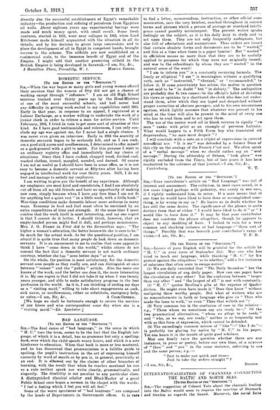BAD LANGUAGE.
[To THE EDITOR or THE "SPECTATOR."] Sia,—The final cause of "bad language," in the sense in which " H. C." uses the term, seems to be the fact that the English lan- guage, of which it is a detail, has no grammar but only a spelling- book, over which the child spends weary hours, and which is a sore hindrance to education. When that book is more or less mastered, and he has discovered that pronunciation is a fallible guide to spelling, the pupil's instruction in the art of expressing himself correctly by word of mouth or by pen is, in general, practically at an end. It is elbowed out by the claims of other branches of learning, with the result that when he reaches manhood he can as a rule neither speak nor write clearly, grammatically, and elegantly. The disability is not peculiar to any particular class. A distinguished classical scholar and ritad-Master of a great Public School once began a sermon in the chapel with the words :
"I feel a feeling which I feel you will all feel."
Some of the worst specimens of "bad language" are composed by the heads of Departments in. Government offices. It is rare to fiad a letter, memorandum, instruction, or other official com- munication, save the very briefest, couched throughout in correct terms and phrases which a person of average or standard intelli- gence cannot possibly misinterpret. The present writer speaks feelingly on the subject, as it is his daily duty to study and to act upon them. They are not only frequently ambiguous, but also full of affectations and mannerisms. Thus orders are issued that certain obsolete forms and documents are to be "wasted," and this at a time when there is a paper famine! But " wasted " in officialese means no more than that they are to be usefully applied to purposes for which they were not originally issued; and woe to the subordinate by whom they are " wasted " in the natural sense of the word!
"I am to inform you" is a constantly recurring formula. The lonely or elliptical "I am" is meaningless without a qualifying verb, such as "instructed," "charged," or "recommended," to follow it. If some aincertainty has arisen, the matter in question is not said to be " in doubt" but "in dubiety." The ambiguities are probably due fo two causes—to the official's habit of dictating his views or opinions to a shorthand she-clerk who does not under- stand them, after which they are typed and despatched without proper correction of obscure passages; and to his own unconscious egotism, which lightly assumes that whatever was present in his mind at the time will also be present in the mind of every one who has to read them and to act upon them.
The use of the neuter word nil in blank returns to signify "ic man" ranks with prior as an example of perverse Latinity. What would happen to a Fifth Form boy who translated nil desperandum, "no man must despair " ?
I will conclude with a note on a triplet of expressions in current non-official use. "It is me" was defended by a former Dean of this city on the analogy of the French C'est moi. We often speak of a "verbal message" when we should rather say an "oral message." • During the editorship of Delano, "took place" was rigidly excluded from the Times, but of late years it has been readmitted to the columns of that journal.—! am, Sir, Ste..


































 Previous page
Previous page